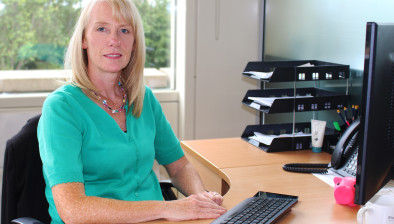Lorna Cameron: Time to fast-track Universal Housing Design

Lorna Cameron
Horizon Housing CEO Lorna Cameron calls on housing minister Paul McLennan to move accessible housing higher up the political agenda.
The appointment of Paul McLennan as the first dedicated Housing Minister since 2016 brings fresh hope along with expectations that accessibility, one of the most urgent housing issues impacting people’s lives, can rise to the top of the ministerial in-tray.
A critical shortage of homes that can be accessed by anyone, regardless of age, ability or disability, impacts heavily on people in many ways, from health to wellbeing and being able to live independent lives.
It also impacts on strained public services from health to social care as people who are medically fit to go home are either stuck in a hospital bed or moved to care homes if their own homes are deemed unsuitable or unsafe.
Basic design elements that many of us take for granted become insurmountable barriers to people being able to live independently in their own homes and communities. These range from narrow doorways or corridors which cannot accommodate a wheelchair, to steps outside a property, or a lack of an accessible shower or toilet.
Tackling these issues in design standards is sometimes called inclusive or universal design. Changing the language when we talk about housing design can change mindsets and help policymakers focus on the wider related issues of equality, inclusion and sustainability.
While accessible design focuses on specific groups such as people with a disability and can create a sense of ‘otherness’ or stigma, the core principle of universal design is that it is design for all. It sets a standard for homes that can be used by most people over their lifetime without a need for major adaptations. This includes people who have temporary disabilities; a fracture, a major operation, and also parents with toddlers or using prams.
At Horizon, some 76% of our tenants have a disability of some sort. The firsthand stories we hear from tenants who struggled for years to find a suitable home are heartbreaking.
One young family with a disabled child risked losing him to social care unless they could secure a home able to accommodate his special equipment. Another tenant in his early 50s who had a stroke, faced legal action to move him from a rehabilitation unit to an old people’s home. It was his only housing option until he secured a Horizon property. Many others are in similar positions today.
A new universal standard for flexible living space becomes more urgent as each year passes. It has been more than two years since the publication of the Housing for 2040 strategy which set out a vision for what Scotland’s homes and communities should look like by the end of 2040.
Although it had much to commend it, including a review of adaptations and new building standards and plans for new Scottish Accessible Homes Standards, progress towards drafting and implementing new and better standards has been painfully slow.
We hope the new Housing Minister will accelerate action and collaborate with colleagues in health, social care, local government and planning to deliver joined-up solutions. The housing sector is ready and anxious to join these efforts and to share initiatives we have already begun such as Horizon’s Accessible Housing Network and the SFHA’s Inclusive Living Toolkit.
We should adopt the language of universal design and commit to this as our national standard. Working with builders, architects, developers, social care experts and tenants and homeowners, including those with disabilities, is also essential in formulating new standards.
Recently the government demonstrated its ability to act decisively and speedily on a crucial housing issue, fast-tracking legislation for energy-efficient homes. A proposal for the Domestic Building Environmental Standards (Scotland) Bill, which sought to introduce Passivhaus standards (an internationally recognised standard for ultra-low energy homes) for all newly built houses was submitted in November 2022. In January the Scottish Government committed to using secondary legislation to bypass a lengthy process, consequently the standard will be in place within two years.
It was hailed as a forward-thinking policy that would future-proof homes as well as upskilling the construction sector and making Scotland a leading player. The same argument holds true for universal design standards.
Adapting existing homes naturally comes at a cost, as does building new ones designed for inclusive living. However, there is an even greater cost related to inaction.
In Australia, where activists won a 20-year fight to introduce national universal design standards, two years of research found that the cost of doing so was outweighed by the benefits to society.
In the UK, it costs an estimated £1,400 per property to provide basic adaptations that could enable a person to remain in their home. By contrast it costs £290 a day for a person to stay in a hospital bed, which over the last decade has added up to a £1.2 billion bill for delayed discharges for NHS Scotland. Meantime, a place in a residential care home costs around £39,000 per year, a recurring cost.
Housing, health and social care issues are inextricably linked as inadequate or poorly designed houses impact health and wellbeing. In a challenging economic environment, we cannot be complacent about these impacts on the public purse. According to the Fraser of Allander Institute, social care costs in Scotland will almost double from £8.4 billion in 2018 to £16.5 billion in 2038.
One million people in Scotland already have some form of disability and demographic trends indicate that we will all be living longer but more of us will need support. The number of people aged 65 and older is set to rise by 29.7% by 2045.
Having suitable housing is a basic human right and one that will play an increasing role in future in enabling independent living.
A key lesson on universal design in Australia was that voluntary guidelines failed and that in order to bring about real change in design and construction, national legislation was essential. A new minister can bring fresh impetus to a pressing problem.







